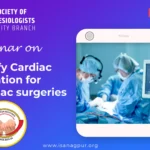
Organ transplant and the role of Anesthesiologist
Transplantation medicine is one of the most challenging and complex areas of modern medicine.Organ transplantation is a medical procedure in which an organ is removed from one body and placed in the body of a recipient, to replace a damaged or missing organ. Organ donors may be living (related or non-related) or cadaveric(brain dead, or dead via circulatory death).Organs that have been successfully transplanted till date include the heart, kidneys, brain, liver, lungs, pancreas, intestine, and thymus.
The need for organ has gone up substantially all over the world. India too suffers from acute organ shortage with little to no solution for this issue. It is estimated that every year 1.5 lakh people suffer from renal failure out of which only 3000 people get donors. The situation for liver and donation is perhaps even worse. Reasons for shortage of organ donors in India are ignorance, lack of knowledge and few myths and superstitions which go along with the idea of organ donation. Therefore, we need widespread campaigns to spread awareness about organ donation in India and to bridge the gap between supply and demand.On the background of increasing organ demand, compared to the number of organs available for transplantation, the responsibility to care for potential donor increases. An anaesthesiologist plays an important role in a multidisciplinary team which is necessary for successful organ donation.
One may wonder about the role of an anesthesiologist in organ donation by a brain-dead person. An anesthesiologist’s job is to keep a patient’s organs well-perfused and well-oxygenated. Usually this is synonymous with keeping a patient alive under anesthesia. In this special case, it means keeping the patient’s heart and lung functions stable so that the donated organs can continue to give life in another or several others. The patient is dead for all of his or her loved ones but alive in ways that will matter to others especially those who will be getting new lease of life in the form of donated organs. So at this crucial point of time an anaesthesiologist is taking care of a living shell of someone, a body that is dying and that eventually will come to a full stop.
Highly specific intraoperative management by an anesthesiologist is required during organ procurement after brain death. To manage the heart-beating brain-dead donor, the anesthesiologist must incorporate knowledge of the effects of brain death on each organ system as well as the preoperative measures and support the donor required in the intensive care unit. The physiology of all the available organs in the donor should be normalized and maintained till the time of organ retrieval. It is also important to know which organs are going to be procured in order to establish specific treatment and management goals to optimize the ultimate transplant outcome. During organ procurement after cardiac death, an anesthesiologist’s direct involvement is particularly important for lung donors.
Intensivists and Anesthesiologistsplay a vital role in identification, declaration of brain death, and providing medical care to potential organ donors, thereby improving the outcome quality of organ donation.Anesthesiologists are often involved in the development of hospital policy—particularly
policies that concern the operating room.As physician members of the medical community and the process which poses lots of ethical dilemmas, anesthesiologists play an active role in ensuring that these protocols preserve the rights of dignity of patients and families, while maximizing the opportunities for organ donation.
It’s strange, but these types of cases are not just like other routine ones for an anaesthesiologist, because in a way the patient is dead but not completely dead. Being a part of organ retrieval and transplant team is more humbling, than any other surgery. It’s a concrete reminder of our own fragility and our tenuous hold on life. The noble cause of organ donation makes us realize the paradox that how so small and insignificant we all are at the end of our lives, yet maybe so important and so meaningful.
DR Deepak Madankar, MD
Chief Consultant Anaesthesiologist,
Meditrina Institute of Medical Sciences, Nagpur.

